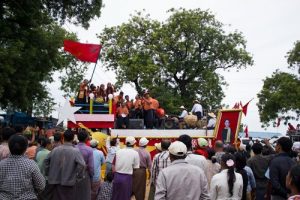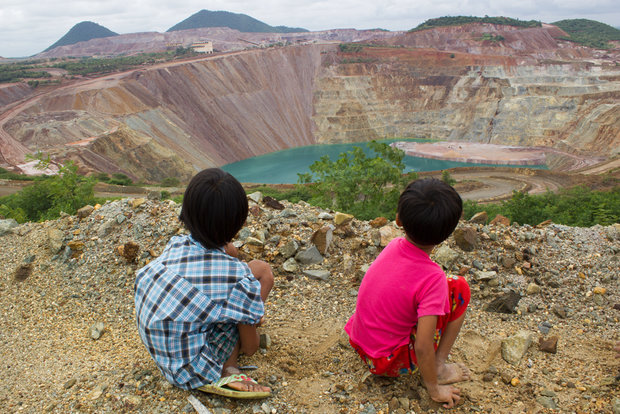The landscape in Salingyi Township, in Sagaing Division, is dominated by the huge Letpadaung copper mine, which has left entire swaths of land barren and carved out several mountains. Ahead of the upcoming elections, the mine also dominates the political landscape.
Hundreds of farmers have been evicted from their lands, and the project has a visible impact on the environment and the health of the local population – who haven’t given up their struggle against the project.
The mine, operated by the Chinese company Wanbao Mining Copper Ltd., in cooperation with the military-owned conglomerate Union of Myanmar Economic Holdings Ltd (UMEH), has been met with strong protests by the local farmers, which have often been brutally repressed by the police.
Most controversially, Aung San Suu Kyi supported the continuation of the project in early 2013, as chairwoman of a parliamentary commission tasked with investigating early clashes with the police and the impact of the mine. When she visited the area in March 2013 to explain the commission’s report, many local farmers shouted at her when they discovered she didn’t advocate for the closing of the mine. Eventually their anger virtually pushed her out from the area. It was a scene with no precedent: for the first time in recent history, Aung San Suu Kyi was booed by people not paid or coerced by the military regime to do so.
Now, ahead of the elections, all indications are that Aung San Suu Kyi and the National League for Democracy (NLD) have regained their support in the area, even though the opposition to the mine remains as strong as ever. A few days ago, Democratic Voice of Burma witnessed how most of the inhabitants of Ton, a village among those more affected by the land-grabbing cases associated with the mine and one of the centers of the protests against the project, went to the main road near the village to cheer an NLD convoy campaigning in the area.
Ma Thwe Thwe Win, a 32-year-old activist from a nearby village who has been organising the villagers against the project for several years, expressed her support for the NLD. “I don’t blame Aung San Suu Kyi, the recommendations of her report are good, but the problem is that the government is not following them,” she told DVB.
The main candidates
“I’m confident we will win the election,” said the local NLD candidate, Dr Thein Naing, a soft-spoken 49-year-old doctor who joined the party in 2012. “The main problem here is land-grabbing, the second is the health issues, and the third is the damage to the environment,” he said.

“We need to change the law so people can sue the mining company and the government,” he added.
Than Swe, a 45-year-old farmer whose seven acres of land were taken by the company in 2013, also voiced support for Suu Kyi’s opposition party. “I will vote for the NLD. I was angry at Aung San Suu Kyi when she came, but then I read the report and now I support her. We have to get rid of the dictatorship. She can do better for the country,” he said.
Even the USDP candidate, a sturdy 44-year-old trader called Aung Naing, admitted that “people here changed their minds about Aung San Suu Kyi”. Nevertheless, he defends the accomplishments of his party. “The USDP has been in power since 2010, and we have been able to do many things for the people,” he said.
Aung Naing says that his main goal if he wins is to fight against corruption and “to try and implement the recommendations in the report of the parliamentary commission.” He claimed that “if my party wanted to do something against the interests of my constituency, I would be willing to vote against them in parliament.” Nevertheless, he defended the mine: “the project is good because it provides employment to the people.”
Health issues in the area
Ko Hla Oo is a 27-year-old former labourer who now works as gardener in one of the mine compounds. He makes 230,000 kyat (US$180) per month. His wife, Ma Nyo Nyo Win, makes around 40,000 kyat per month selling thanaka (cosmetic paste). They live with their two children in Kangon village, situated near a sulphuric acid plant owned by UMEH. Many people in the village have complained of health problems due to the acidic fumes coming from the factory.
Mg Htet Myat Lin, the couple’s infant son, suffers cerebral paralysis, and the health insurance provided by the company to the father does not cover him, nor the rest of the family.
According to his mother, the boy was born healthy and became sick when he was a month-and-a-half old. He fell into a coma and was admitted to Rangoon General Hospital. When he woke up from his coma, he couldn’t speak or move. “The doctor told us that he was like a broken bicycle which cannot be fixed,” said his mother.
Around one month after Aung San Suu Kyi visited the area in 2013, the local doctor told Ma Nyo Nyo Win that the NLD leader was returning – to pay a visit at the hospital to meet with them and three other families of children suspected of falling ill due to gases from the acid plant. “They made several tests on the boy, and then Daw Suu told me that I should accept that my son cannot be cured,” Ma Nyo Nyo Win said.
[related]
“After that, I hoped that Daw Suu would provide further help to us, but after one year I realised that it was not going to happen and I felt very lonely. Now I understand that she is busy working for the whole country and can’t think only of me,” she added.
Ma Swe, a 42-year-old woman from the same village, is the mother of another of the sick children invited by Suu Kyi to Rangoon. Unlike Ma Nyo Nyo Win’s husband, neither she nor her husband could get a job in the mine. “They told us that we are too old to get a job,” she said.
Her daughter, Zin Mar Swe, who is 20, but looks barley adolescent, also underwent the tests recommended by the NLD chairwoman. “When she was 10 years old there were gases coming from the plant. She lost the sight in one eye. We went to several hospitals and in Mandalay the doctor told us that she had a brain tumour. She underwent surgery, but after the operation she lost her mobility in the right hand and stopped growing. She has never had a period,” the mother explains.
“I met Aung San Suu Kyi when she came to the area in 2013 and I told her about my child,” Ma Swe said. One month later they were invited to go to Rangoon. “At first I thought they were going to provide treatment for our children, but then I realised they were only making tests. I think Daw Suu wanted to find out if the conditions of the children were provoked by the acid plant,” she explains.
“I was disappointed that they didn’t invite us to Rangoon to get treatment, but I feel happy I could meet Daw Suu and I will surely vote for her,” she says enthusiastically.



